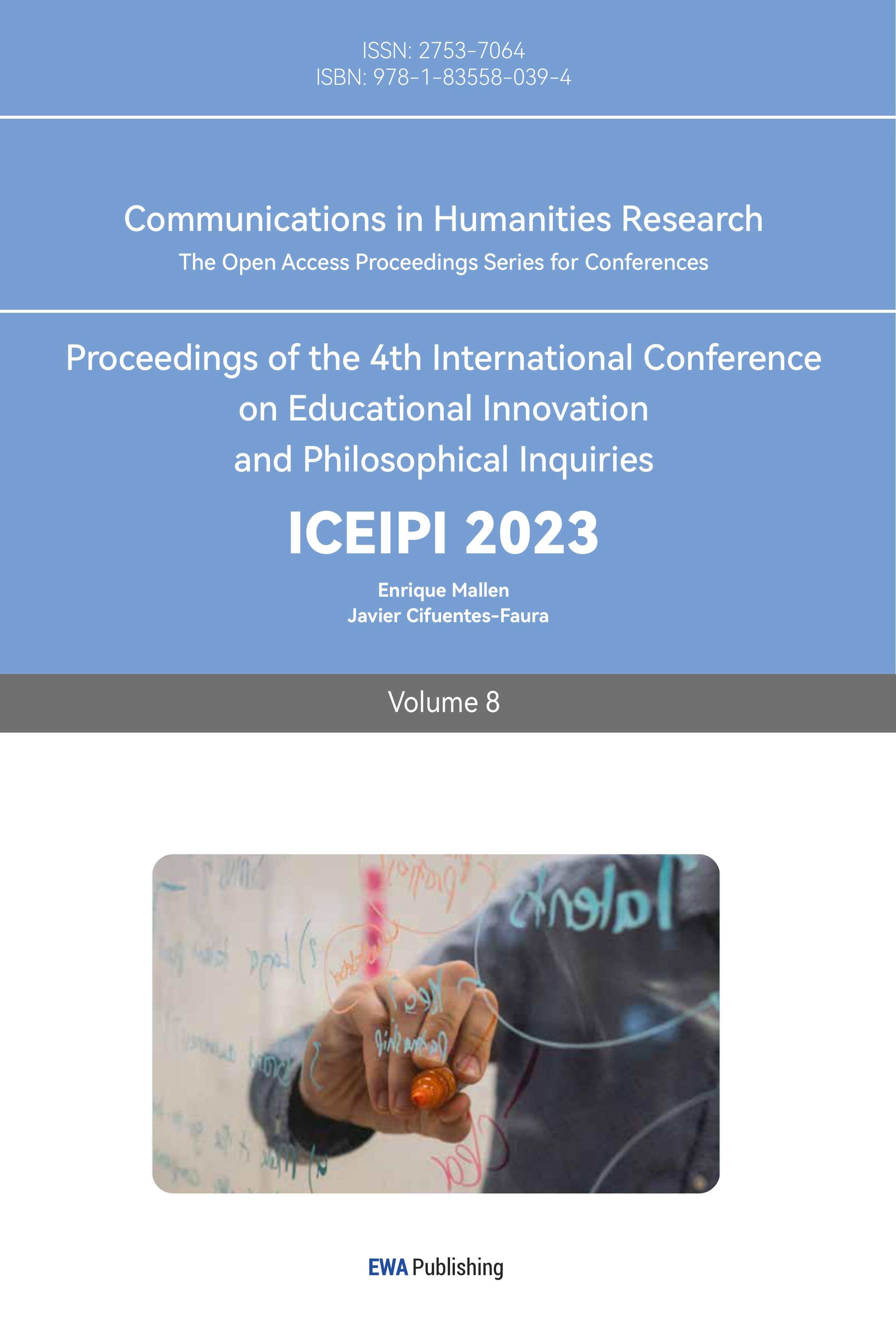1. Introduction
In the process of rapid development in China today, more and more cities are undergoing old city renovations of different scales. The purpose of old city renovation in urban renewal is to demolish, renovate, invest and construct a declining area, replace the functionally decaying material space with a new urban function, and make it develop and prosper again. The current urbanization rate in my country is 64.7%, and it would enter the range of 65%-70% during the 14th Five-Year Plan from 2021 to 2023 [1]. Therefore, the transformation of the old city plays an important role in making the city healthier, safer, and more livable, and becoming a space for people to live with high quality.
Guangzhou is located in the south of mainland China, the central south of Guangdong Province, and the northern edge of the Pearl River Delta. It is the southern gate of China, with a national comprehensive transportation hub. It is a world-renowned port city and an important center in economic, financial, trade, and transportation, exhibition and shipping. It also has historical and cultural ancient buildings such as arcades, with a strong historical and cultural heritage. As a rapidly developing modern city, the transformation of the old city is an important part of promoting urban development. With the rapid development of the social economy and the rapid advancement of urbanization, the mode of urban development has gradually shifted from “incremental expansion” to “stock improvement”. Urban renewal has become the mainstream of today’s construction.
Enning Road, located in the center of the old city of Xiguan in Guangzhou, is rich in historical architectural monuments. As one of the representative old city renovation projects in Guangzhou, its renovation has also attracted widespread attention from people from all walks of life. However, during the long-term renovation of the old city on Enning Road, many problems and contradictions were discovered, such as the destruction of cultural heritage caused by major demolition and reconstruction. Therefore, this article aims at the transformation of Enning Road in Guangzhou, describes the current situation after the transformation, discusses the existing problems, and proposes solutions from the perspective of tourist experience.
2. Background of Enning Road
The Enning Road plot is located in the heart of the old city of Xiguan in Guangzhou, which has a very special meaning for Guangzhou. It is known as “the most beautiful old street in Guangzhou” because of its neat and continuous arcade street, rich and diverse cultural relics and historic sites, and well-preserved life style of the old city. Enning Road is connected to Shangxiajiu Pedestrian Street in the east, accounting for about 3% of the area of Liwan Old Town, with 1,352 original buildings and 2,760 residents (Figure 1).
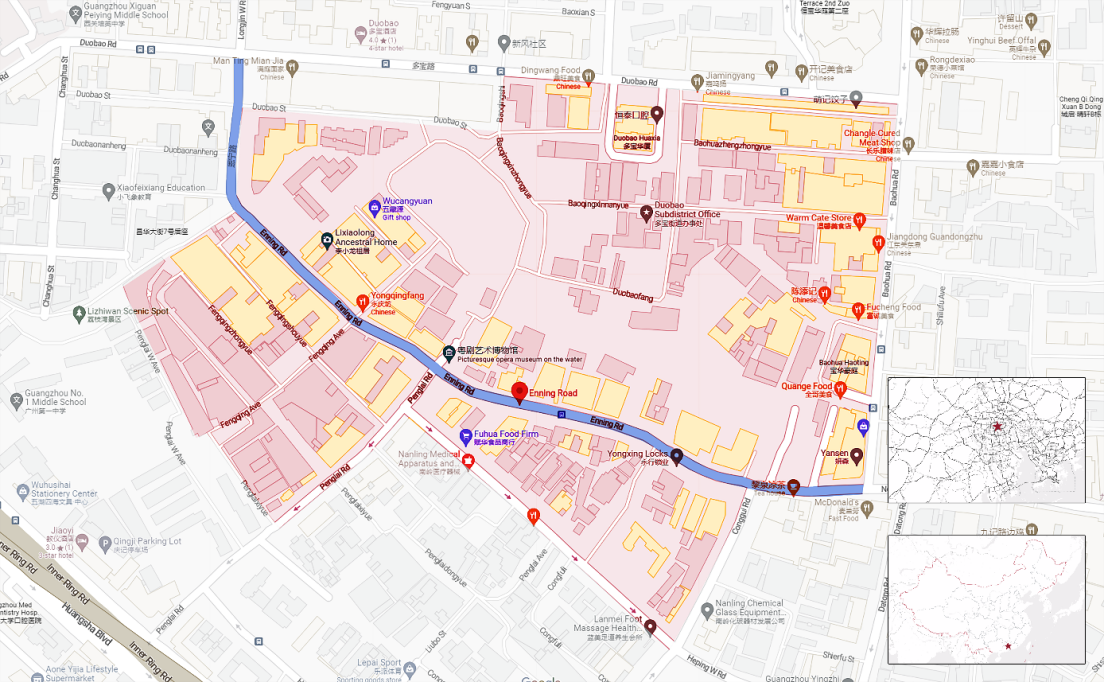
Figure 1: Location of Enning Road in Guangzhou City.
The Xiguan area of Guangzhou has a long history. In the late Ming and early Qing Dynasties, Xiguan area was the main place for foreign trade transactions in Guangzhou. The development of trade exchanges has gradually produced a distinctive business culture in Xiguan area, which is mainly manifested in architectural features, food characteristics, and folk art. The plot has relatively well-preserved arcade buildings in Guangzhou, surrounded by historical buildings such as the ancestral home of Bruce Lee and the Bahe Hall. Traditional culture and folk handicrafts, such as Cantonese opera, Cantonese opera, Cantonese color, and Cantonese embroidery, once gathered and developed here. However, by the 1990s, the land had become one of the districts with the highest concentration of dilapidated and old houses in Guangzhou. It became a comprehensive sample of the development of old Chinese cities and urgently needed repairs.
3. Current Situation and Existing Problems of Renovation
After the 1990s, Enning Road underwent major renovations on a certain scale. The “Pilot Plan for Enning Road Renovation in Liwan District” in 2006 continued the traditional urban renewal approach of major demolition and construction, damaging the original historical context and traditional style of Enning Road. This plan was strongly opposed by citizens, scholars, and non-governmental organizations. In the following decade of renovation, The Enning Road arcade once faced the problem of demolition. Until 2016, the “Guangzhou Urban Renewal Measures” issued and implemented in Guangzhou creatively proposed the “micro renovation” urban renewal model, clarifying that it will no longer demolish and build the old city area, but gradually repair, activate, and cultivate it, so that it can retain vitality and keep the old city old but charming. From the beginning to the present, after more than thirty years of implementation of a series of policies, the renovation of Enning Road has gradually entered the stage of micro renewal from major demolition and construction [2].
Overall, the renovation of the old city restored the arcade, which not only eliminated the danger of dangerous buildings, but also protected historical buildings and local culture to a certain extent. After the renovation, the appearance of the street has taken on a new look. Some shops have been opened, incorporating elements of fashion, leisure, and fashion, adding vitality to the neighborhood and promoting economic revitalization to a certain extent. For example, experience stores such as Guangdong Xingshi, Colored Porcelain, and Enamel have been established around Yongqing Square, forming an intangible cultural heritage zone. However, with the continuous enrichment of business formats, Enning Road is gradually transformed into a tourist commercial center, but the transformation lacks consideration from the perspective of tourists. For example, some streets are difficult to pass, leading to a decrease in tourists’ comfort during the tourism process; Roads have safety hazards, bringing inconvenient travel for tourists; The streets and alleys on both sides of the road are complex, and tourists are not familiar with the local area, spending a lot of time searching for routes.
4. Suggestions for Scenic Area Planning Based on Tourist Experience
In the current development of the tourism industry, tourists are no longer satisfied with the experience obtained during sightseeing, but pay more attention to a sense of participation. With the premise of ensuring safety, tourism experiences are formed through aesthetic, consumption and other behaviors [3]. For example, tourists’ experience sense is satisfied when they believe that the value and gains of travel exceed the cost. Moderate pedestrian flow reduces congestion and increases comfort, while clear transportation routes provide convenience. Therefore, comfort and convenience during travel are also indispensable aspects of the tourist experience; Enhancing the interactive experience between scenic spots and tourists could increase tourists’ interests in the scenic area and overall satisfaction [4].
It is indicated that the ideal tourist experience characteristics are mainly reflected in the sense of value, comfort, convenience, interactivity, and other aspects based on safety. Therefore, this article considers the above aspects and provides some planning and suggestions from three perspectives: store decoration, scenic area transportation, and characteristic tourism routes [5].
4.1. Store Decoration
In terms of comfort and interactivity, it is recommended that the external decoration of the stores should be unified, so that neat displays can enable visitors to capture information from each store more clearly and increase the aesthetic beauty of the block. It is noted that the unique characteristics of the arcade section should also be preserved during renovation. The arcade-specific advertising decoration can also reflect the local cultural characteristics, and advertising signs with different contents can reduce visitors’ aesthetic fatigue.
4.1.1. Zoning Decoration
Based on the analysis of different functional zones in Enning Road, we suggest to divide the Enning Road shops into zones (see Figure 2), including an orange food zone, a blue and red mixed commercial zone, and a green landscape zone.
This zoning planning concept has been successful applied in many parts of the world, such as the Cancun Tourism Resort in Mexico. Cancun Tourism Resort is located on the Caribbean coast, and is a beautiful island that is 21 kilometers long and only 400 meters wide. It is known as a world-class coastal tourist destination. Its success is due to its division including eight functional zones: hotel zones (Cancun Island), residential areas (Cancun City), international airport areas, and protected areas [6]. It is formed a tourist destination that combines coastal living, dining, experiences, and ecological landscape resources.
Based on the zoning planning concept, we design different external decoration materials to unify and distinguish different zones on Enning Road. Visitors could fully experience the unique feelings belonging to the area, creating memory points, producing visual interaction, and generating corresponding comfort feelings.
For the mixed commercial zone, we design a light-colored coating-type multi-layer pattern coating on the external wall, which has a luxurious and dignified decorative effect. The pattern has a strong three-dimensional sense, with concave and convex details, and has a certain fashion element with a strong modern sense [7]. As some of the Enning Road shop walls are not even, the multi-layer pattern coating has a good protective effect on the wall and can cover up the uneven base layer due to its high adhesive strength and excellent durability. Since the red area has a higher density of shops than the blue area, the color of the facade in the red area should be lighter than that in the blue area.
For the orange food zone, we suggest using light yellow sand coating, which sparkles under the sunlight and has a strong aesthetic appeal. Light yellow can stimulate the neural center associated with happiness and enhance people’s appetite.
For the landscape zone, we suggest using materials that imitate wood tiles. These materials are waterproof, moisture-proof, and insect-proof, and are very environmentally friendly. Moreover, they have a primitive feeling in nature and are very suitable for facade decoration in the landscape zone.
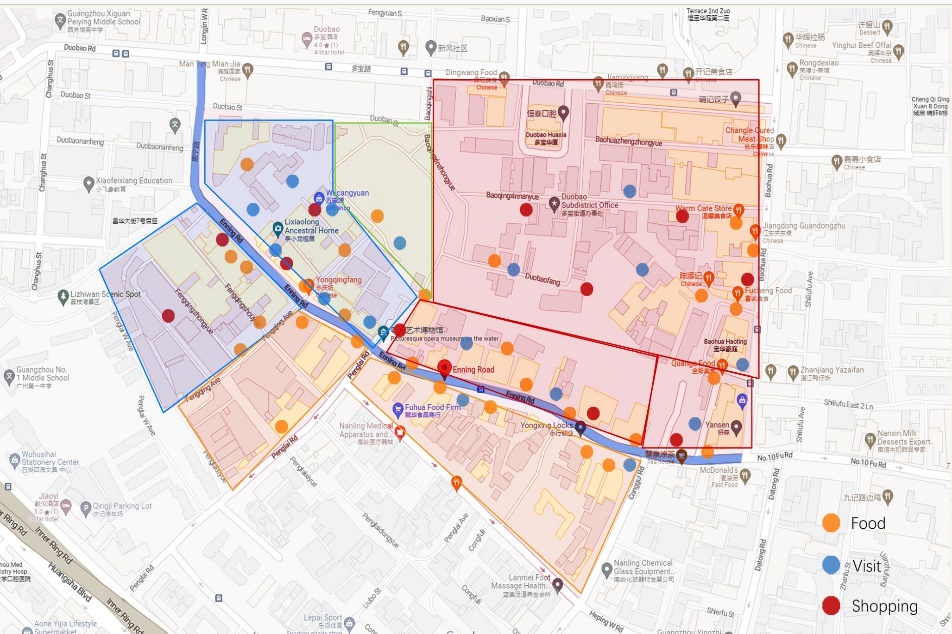
Figure 2: Enning Road functional zoning plan.
4.1.2. Shop Logos
To preserve the original features and overall aesthetics of the arcade, we suggest designing a new type of logo related to the arcade on each merchant’s advertising sign to increases uniformity while also retain the historical features of the arcade. The design of shop signs in Hong Kong can be a good reference case. On the streets of Hong Kong, one can easily see various shop signs with unique characteristics standing outside. The design space is much larger than that of uniform shop signs. The shop signs have countless variations in font and image combinations, and also 12 different presenting ways on buildings, such as hanging horizontally, standing vertically, or in storefronts. The fonts used are mostly calligraphic handwriting, which adds traditional charm, making this a great value for cultural old streets. Whether it’s day or night, the neon signs arranged in a staggered manner are very eye-catching to tourists. The signs do not block each other and achieve a beautiful sense of layering, which is mostly intentional on the part of the shop owners and has become a major characteristic of Hong Kong’s shop signs.
In terms of visual interaction, neon signs undoubtedly have a greater advantage. In the exterior decoration of shops on Enning Road, the use of neon signs can achieve a neat yet diverse artistic feeling. When designing shop signs, elements such as visual expression, font, design, aesthetic value, content requirements, construction mode, viewing distance, and interaction with the city, should be considered [8].
4.2. Scenic Area Transportation
For the comfort and safety of tourists, we propose the “pedestrian traffic lights” + “zebra crossing” mode to minimize pedestrians’ concerns when crossing the street with motor vehicles, thus increasing tourist comfort. We suggest installing pedestrian traffic lights in ten main intersections on Enning Road (Figure 3) to ensure pedestrian safety.
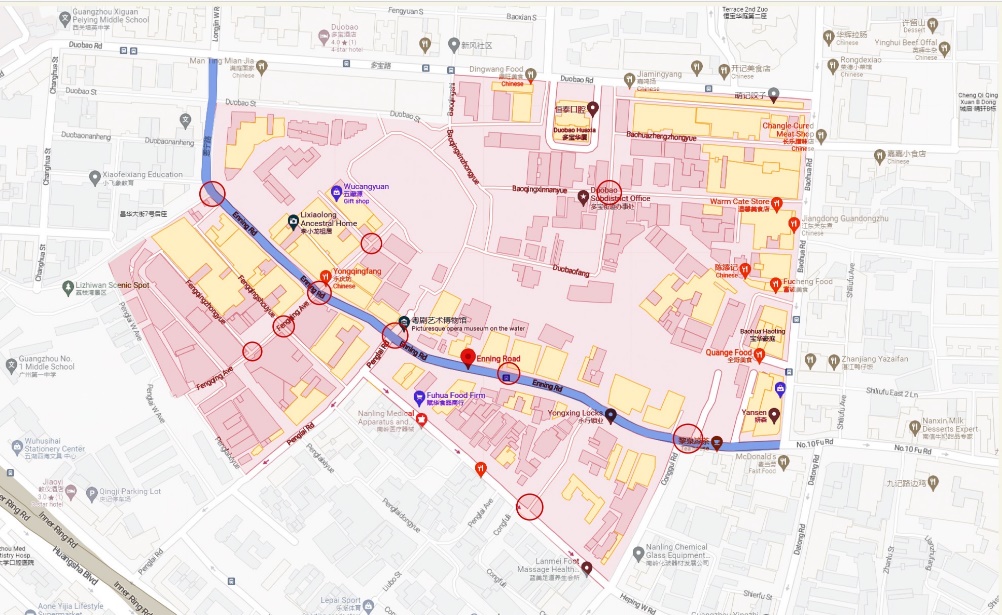
Figure 3: Locations for pedestrian traffic lights (indicated by red circles).
Regarding the issue of pedestrian safety, we have taken inspiration from the approach implemented on Zhongshan Road in Xiamen. The layout of Zhongshan Road is similar to that of Enning Road, where the installation of a barrier in the middle of the road can reduce jaywalking and the use of traffic lights and zebra crossings at regular intervals can regulate pedestrian flow and traffic. As a first-tier city with a large population, Shanghai has corresponding measures to address pedestrian safety issues. Nanjing Road Pedestrian Street is also a well-known pedestrian street, which differs from Zhongshan Road as it has pedestrian walkways on both sides of the road with a vehicle passing zone in the middle. The two sides are connected by zebra crossings and traffic lights, and each side is equipped with small-sized bollards and retractable barriers that can be lowered during certain periods to achieve comprehensive utilization of both sides of the road. This approach is suitable for the sections of Enning Road that lead to the alleys on both sides. However, compared with Nanjing Road, Enning Road and the alleys on both sides are relatively narrow. Therefore, we recommend the use of small-sized bollards and retractable barriers to ensure pedestrian convenience and road accessibility.
Regarding the management of non-motorized vehicles in the scenic area, we suggest setting up unified non-motorized vehicle parking areas (Figure 4) and strengthening control over non-motorized vehicles within the scenic area. This could greatly improve the visitor experience. Therefore, we select ten spacious locations that do not affect the operation of stores as non-motorized vehicle parking areas. This unified management approach enhances the scenic area’s appearance and traffic safety while improving visitor comfort [9].
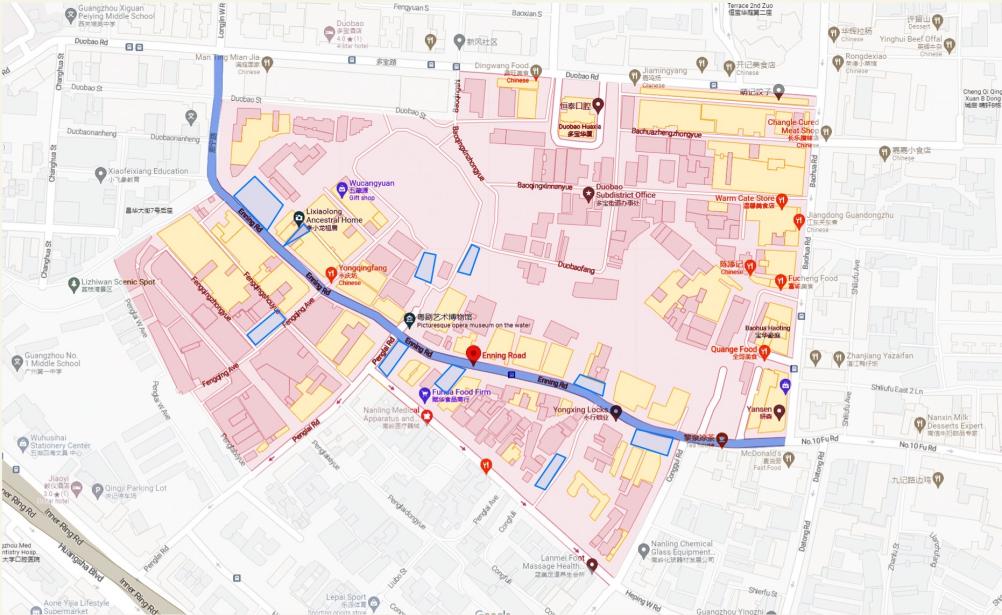
Figure 4: Non-motorized vehicle parking areas (blue boxes).
4.3. Featured Tourist Routes
In order to enhance the portability of the scenic area based on tourist comfort, we propose a preliminary micro-transformation plan for Enning Road by combining the distribution of shops with tourist needs and implementing featured tourist routes. The featured routes are divided into three categories: gourmet (Figure 5), sightseeing (Figure 6), and shopping (Figure 7) routes. The routes link the scenic area together, improving tourism convenience. It should be noted that, it is difficult to plan the same type of shops on the same route due to the scattered distribution of shops, so each featured route can have different branches. When planning the route, it is required to keep close cooperation with the shops, and the route needs to be updated regularly based on changes in the shops.
The designed routes could alleviate traffic congestion, disperse pedestrian flow, and solve the problem of unfamiliar roads for non-local tourists, greatly improving travel efficiency. Since the route planning can choose fixed roads, other micro-updating projects can be better implemented, reducing the impact on shops, promoting secondary consumption in tourism, and achieving better revenue [10].
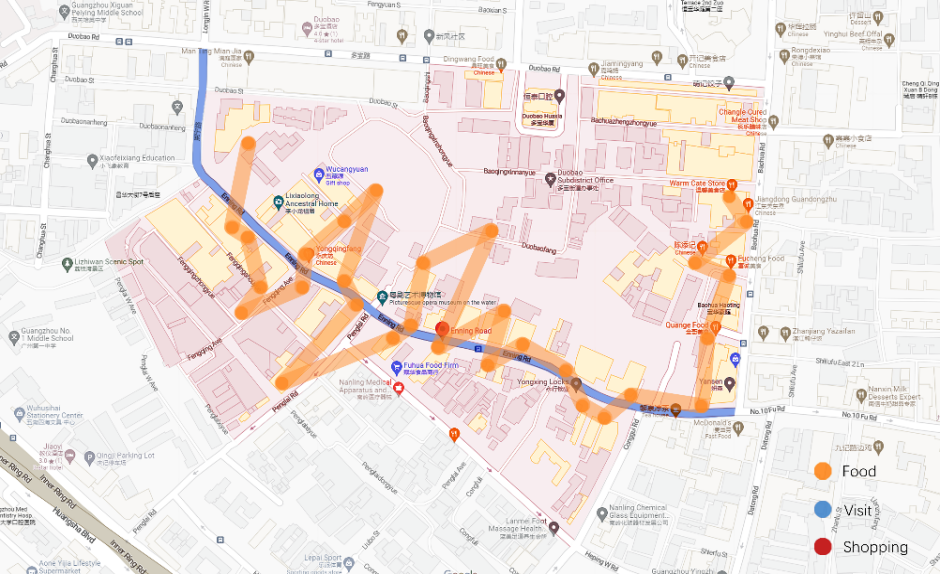
Figure 5: Gourmet Route.
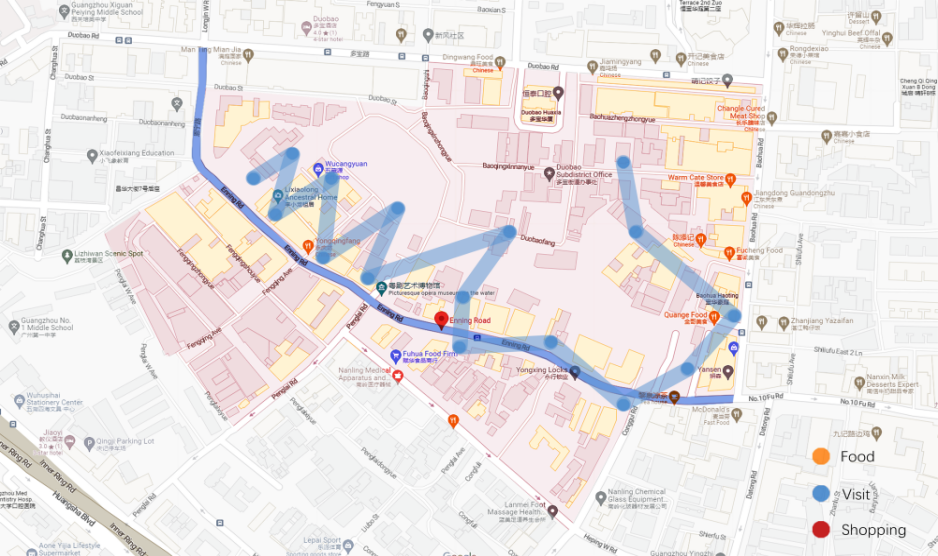
Figure 6: Sightseeing Route.
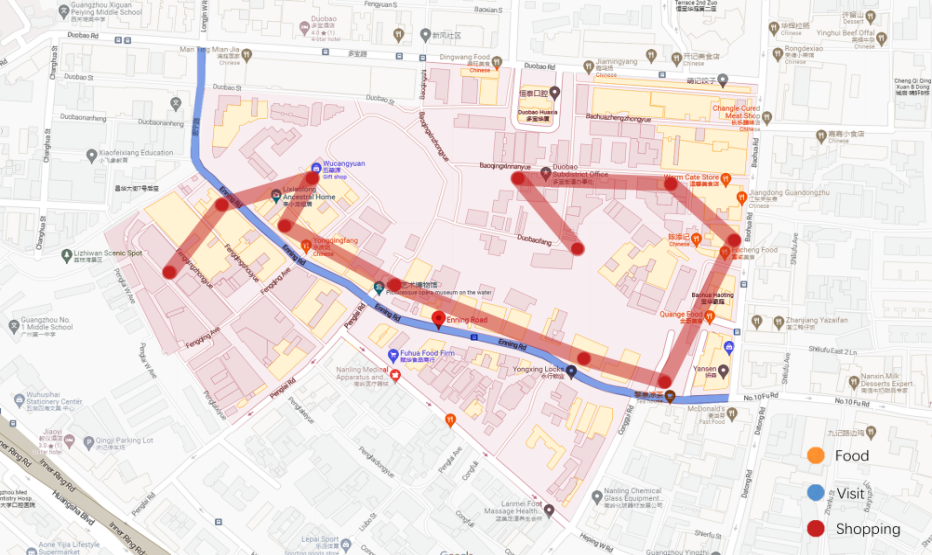
Figure 7: Shopping Route.
5. Conclusion
This study discusses the renovation project of the old district of Enning Road in Guangzhou, describes the current situation and problems of the renovation, and provides suggestions for renovation from the perspective of visitors’ sense of experience, offering a new perspective for the conservation of the historical and cultural district.
Since the end of the 19th century, Enning Road has undergone a transformation process from a major demolition to an urban micro-renewal, gradually becoming a commercial centre with local historical and cultural characteristics. With time, the inadequate construction of Enning Road for tourists’ convenience, safety and other experiential aspects has been exposed due to the abundance of businesses and the increase of tourists. After analysing the problem from multiple angles, this paper puts forward suggestions for zoning beautification of shop decoration and construction of special logos, strengthening traffic safety planning in scenic areas, and building special tourist routes from the needs of travellers.
References
[1]. Guanyan Report Network. 2022. Research on the Development Status and Investment Trends of China’s Urban Renewal Industry (2022-2029).
[2]. Huang Xuxin. 2020. Research on the conservation and revitalization of Enning Road historical and cultural district from the perspective of community creation (Master’s thesis, Guangdong University of Finance and Economics).
[3]. Li Ying. 2008. Analysis of tourist satisfaction and influencing factors in tourist destinations - Taking the domestic market in Xi’an as an example Brigade Journey Journal, 23 (4), 6.
[4]. Guan Jingbo. 2020. The application of multi-sensory interactive landscape in urban street space (Master’s thesis, Anhui Agricultural University).
[5]. Liu C. 2013. Regeneration of Historical and Regional Cultural Elements in the Design of Old Brand Logo (Master’s thesis, Shanxi University).
[6]. Wang Sheng. 2011. What should Hainan learn from Cancun? Today Hainan (02), 30-31.
[7]. Hou Maosheng. 1992. Construction of Multilayer Architectural Coatings. Coatings Industry (05), 24-27+4.
[8]. Tan Zhiheng. 2020. Communication Architecture: The Visual Language of Hong Kong’s Neon Signage.
[9]. Long P. 2023. Urban Design Strategies in Urban Renewal: A Case Study of Jia Chang Yuan Hi-tech Industrial Park Urban Renewal Unit Planning Project in Bantian Street, Longgang District. Urban Construction Theory Research (Electronic Edition), (09), 155-157.
[10]. Wang B. (2023, March 08). Improving the Quality of Life: The City “Renewal” Goes Upward. Qingdao Daily, F01.
Cite this article
Liu,H.;Xu,R.;Zhu,T. (2023). The Current Situation and Measures of Enning Road Old City Renovation in Guangzhou City. Communications in Humanities Research,8,54-62.
Data availability
The datasets used and/or analyzed during the current study will be available from the authors upon reasonable request.
Disclaimer/Publisher's Note
The statements, opinions and data contained in all publications are solely those of the individual author(s) and contributor(s) and not of EWA Publishing and/or the editor(s). EWA Publishing and/or the editor(s) disclaim responsibility for any injury to people or property resulting from any ideas, methods, instructions or products referred to in the content.
About volume
Volume title: Proceedings of the 4th International Conference on Educational Innovation and Philosophical Inquiries
© 2024 by the author(s). Licensee EWA Publishing, Oxford, UK. This article is an open access article distributed under the terms and
conditions of the Creative Commons Attribution (CC BY) license. Authors who
publish this series agree to the following terms:
1. Authors retain copyright and grant the series right of first publication with the work simultaneously licensed under a Creative Commons
Attribution License that allows others to share the work with an acknowledgment of the work's authorship and initial publication in this
series.
2. Authors are able to enter into separate, additional contractual arrangements for the non-exclusive distribution of the series's published
version of the work (e.g., post it to an institutional repository or publish it in a book), with an acknowledgment of its initial
publication in this series.
3. Authors are permitted and encouraged to post their work online (e.g., in institutional repositories or on their website) prior to and
during the submission process, as it can lead to productive exchanges, as well as earlier and greater citation of published work (See
Open access policy for details).
References
[1]. Guanyan Report Network. 2022. Research on the Development Status and Investment Trends of China’s Urban Renewal Industry (2022-2029).
[2]. Huang Xuxin. 2020. Research on the conservation and revitalization of Enning Road historical and cultural district from the perspective of community creation (Master’s thesis, Guangdong University of Finance and Economics).
[3]. Li Ying. 2008. Analysis of tourist satisfaction and influencing factors in tourist destinations - Taking the domestic market in Xi’an as an example Brigade Journey Journal, 23 (4), 6.
[4]. Guan Jingbo. 2020. The application of multi-sensory interactive landscape in urban street space (Master’s thesis, Anhui Agricultural University).
[5]. Liu C. 2013. Regeneration of Historical and Regional Cultural Elements in the Design of Old Brand Logo (Master’s thesis, Shanxi University).
[6]. Wang Sheng. 2011. What should Hainan learn from Cancun? Today Hainan (02), 30-31.
[7]. Hou Maosheng. 1992. Construction of Multilayer Architectural Coatings. Coatings Industry (05), 24-27+4.
[8]. Tan Zhiheng. 2020. Communication Architecture: The Visual Language of Hong Kong’s Neon Signage.
[9]. Long P. 2023. Urban Design Strategies in Urban Renewal: A Case Study of Jia Chang Yuan Hi-tech Industrial Park Urban Renewal Unit Planning Project in Bantian Street, Longgang District. Urban Construction Theory Research (Electronic Edition), (09), 155-157.
[10]. Wang B. (2023, March 08). Improving the Quality of Life: The City “Renewal” Goes Upward. Qingdao Daily, F01.





